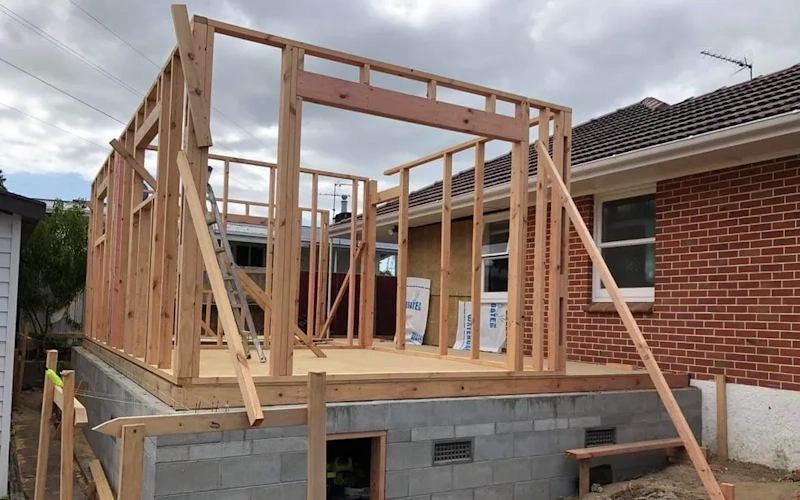Undertaking a major home renovation is an exciting yet daunting endeavor. Whether you’re planning a complete kitchen remodel, a home addition, or a whole-house renovation, careful preparation is key to ensuring the project runs smoothly and stays on budget. General contractors often see projects delayed or costs rise due to a lack of proper preparation by homeowners. In this blog, we’ll share expert tips on how to prepare your home for a major renovation, helping you avoid common pitfalls and make the most of your investment.
1. Set Clear Goals and Expectations
Before any work begins, it’s crucial to have a clear understanding of what you want to achieve with your renovation. Setting clear goals and expectations will guide every decision you make throughout the project.
1.1 Define Your Objectives
- Functionality: Consider what you want to accomplish with the renovation. Are you looking to increase your home’s functionality, add more space, or update an outdated design? Clearly defining your objectives will help you make decisions that align with your goals.
- Aesthetics: Think about the overall look and feel you want to achieve. Gather inspiration from design magazines, websites, and social media platforms like Pinterest. Creating a vision board or design plan can help you communicate your preferences to your contractor.
- Resale Value: If you’re planning to sell your home in the future, consider how the renovation will impact its resale value. Focus on updates that appeal to a broad range of buyers, such as modern kitchens, updated bathrooms, and energy-efficient features.
1.2 Establish a Budget
- Set a Realistic Budget: Determine how much you’re willing to spend on the renovation and set a budget that reflects your financial situation. Be sure to include a contingency fund of 10-20% to cover unexpected expenses.
- Prioritize Spending: Decide where to allocate your budget based on your goals. For example, if you’re focused on creating a luxury kitchen, you may need to save on other areas, such as fixtures or finishes.
- Get Multiple Quotes: Obtain quotes from several contractors to get a sense of the costs involved. Make sure the quotes include all aspects of the project, including materials, labor, permits, and cleanup.
2. Hire the Right General Contractor
Choosing the right general contractor is one of the most important decisions you’ll make during your renovation. A skilled and experienced contractor will ensure that the project is completed on time, within budget, and to your satisfaction.
2.1 Research and Recommendations
- Ask for Referrals: Start by asking friends, family, and neighbors for recommendations. If someone you know has had a positive experience with a contractor, that’s a good sign.
- Check Online Reviews: Look for contractors with strong online reviews and a solid reputation. Websites like Google, Yelp, and the Better Business Bureau can provide valuable insights into a contractor’s reliability and quality of work.
2.2 Verify Credentials
- Licensing and Insurance: Ensure that the contractor is licensed to work in your area and carries adequate insurance, including liability and workers’ compensation. This protects you in case of accidents or damage during the renovation.
- Experience and Expertise: Choose a contractor with experience in the type of renovation you’re planning. Ask to see a portfolio of previous projects and check references to ensure they have a track record of delivering quality work.
2.3 Communication and Contracts
- Clear Communication: Effective communication is key to a successful renovation. Choose a contractor who listens to your needs, answers your questions, and keeps you informed throughout the project.
- Detailed Contract: The contract should outline the scope of work, timeline, payment schedule, materials, and warranties. Make sure all aspects of the project are included in the contract to avoid misunderstandings later on.
3. Prepare Your Home and Family
A major renovation can disrupt your daily life, so it’s important to prepare your home and family for the changes ahead. Taking these steps will help minimize stress and keep the project on track.
3.1 Set Up a Temporary Living Space
- Create a Functional Space: If the renovation involves your kitchen, bathroom, or another essential area, set up a temporary living space in another part of your home. For example, create a makeshift kitchen with a microwave, mini-fridge, and basic utensils.
- Plan for Disruptions: Be prepared for disruptions to your daily routine, such as noise, dust, and limited access to certain areas. Consider staying with friends or family if the renovation is extensive.
- Protect Valuables: Remove or protect any valuable items, furniture, or décor that could be damaged during the renovation. Use plastic sheeting, drop cloths, or storage units to keep items safe.
3.2 Communicate with Neighbors
- Inform Your Neighbors: Let your neighbors know about the upcoming renovation, especially if it will involve noise, dust, or limited street parking. Keeping them informed can help maintain good relationships and prevent conflicts.
- Consider Their Schedule: If possible, schedule noisy work during times that are least likely to disturb your neighbors, such as mid-morning or early afternoon.
4. Obtain Necessary Permits and Approvals
Before starting any major renovation, it’s essential to obtain the necessary permits and approvals from your local building authority. Failing to do so can result in fines, delays, and complications when selling your home.
4.1 Understand Permit Requirements
- Building Permits: Most major renovations require a building permit, especially if you’re making structural changes, altering the plumbing or electrical systems, or adding square footage to your home.
- Zoning Approvals: If your renovation involves changes to the exterior of your home, such as an addition or a new deck, you may need to obtain zoning approval to ensure compliance with local regulations.
- Homeowner’s Association (HOA) Approval: If you live in a community with an HOA, check with them before starting the renovation. HOAs often have specific rules regarding exterior changes, landscaping, and architectural style.
4.2 Work with Your Contractor
- Contractor’s Role: Your contractor should be familiar with local building codes and permit requirements. They can handle the permitting process on your behalf, ensuring that all work complies with regulations.
- Inspections: Be prepared for inspections at various stages of the renovation. Your contractor will schedule these inspections and address any issues that arise to ensure that the project meets code requirements.
5. Plan for Unexpected Issues
Even with the best planning, unexpected issues can arise during a major renovation. Being prepared for these challenges will help you stay calm and keep the project on track.
5.1 Budget for Contingencies
- Set Aside Funds: As mentioned earlier, set aside 10-20% of your budget as a contingency fund to cover unexpected expenses, such as hidden water damage, structural issues, or changes to the project scope.
- Be Flexible: Understand that some changes may be necessary as the project progresses. For example, if your contractor discovers outdated wiring behind the walls, you may need to update the electrical system for safety.
5.2 Prepare for Delays
- Weather Delays: Weather can impact the timeline of your renovation, especially if it involves exterior work. Be prepared for potential delays due to rain, snow, or extreme temperatures.
- Supply Chain Issues: Material shortages or delays in delivery can also slow down the project. Work with your contractor to select materials early and have backups in case of supply chain disruptions.
6. Stay Involved and Monitor Progress
While your contractor will manage the day-to-day work, staying involved in the project is essential to ensure that everything goes according to plan.
6.1 Regular Check-Ins
- Site Visits: Make regular visits to the job site to monitor progress and address any concerns. Seeing the work firsthand will help you understand the scope of the project and make informed decisions.
- Communication: Keep the lines of communication open with your contractor. Schedule regular check-ins to discuss the project’s status, review any changes, and ensure that everything is on track.
6.2 Address Issues Promptly
- Problem-Solving: If you notice any issues or have concerns about the work being done, address them promptly with your contractor. Early intervention can prevent small problems from becoming major setbacks.
- Document Changes: Keep a record of any changes to the project scope, timeline, or budget. Make sure these changes are reflected in the contract and approved by both parties.
7. Prepare for the Final Walkthrough
As the renovation nears completion, it’s time to prepare for the final walkthrough and ensure that everything meets your expectations.
7.1 Inspect the Work
- Thorough Inspection: During the final walkthrough, inspect all aspects of the renovation, including finishes, fixtures, and functionality. Look for any imperfections, incomplete work, or items that don’t meet your expectations.
- Punch List: Create a punch list of any items that need to be addressed before the project is considered complete. Your contractor should address these items promptly to ensure your satisfaction.
7.2 Final Payments and Warranties
- Final Payment: Once the punch list items are resolved and you’re satisfied with the work, you can make the final payment. Ensure that all payments are made according to the terms outlined in the contract.
- Warranties: Review any warranties or guarantees provided by the contractor or manufacturers of materials and fixtures. Make sure you understand what is covered and for how long.
Conclusion
A major home renovation is a significant undertaking that requires careful planning, clear communication, and the right team of professionals. By setting clear goals, hiring a reputable contractor, and preparing your home and family for the changes ahead, you can minimize stress and ensure a successful outcome. While unexpected issues may arise, staying involved in the project and addressing challenges promptly will help you achieve the home of your dreams. Whether you’re renovating to enhance your living space, increase your home’s value, or simply update its look, proper preparation is the key to a smooth and rewarding renovation experience.








